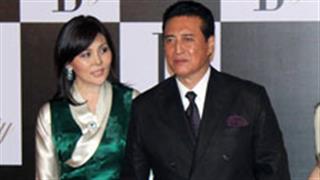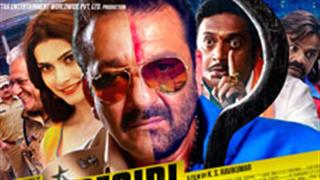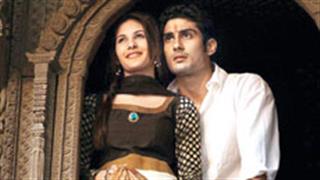Welcome to the new Bollywood where new-age cinema scripts demand newer, fresher voices all the time. Are the days of musical superstars over? Deepali Dhingra explores the phenomenon
What's common between Monali Thakur, Arijit Singh, Nikhil Paul George, Shefali Alvares, Mili Nair and Keerthi Sagathia? Well, for starters, chances are that these are names that you probably don't recognise at the moment. And secondly, it's guaranteed that you're going to be hearing a lot about these names in the coming few months.
So who are they, really? Well, all these people are among the growing breed of singers, who are quickly making their mark in the playback industry.
The reasons for the same can be many -- more music platforms in the shape of music reality shows, the kind of films being made today that lend themselves to a variety of music genres and therefore, different singers, audiences becoming more accepting of different genres and voices -- among others. Whatever the reason, the music industry is welcoming this change with open arms.
`It's wonderful that there are so many talented singers out there who are getting a chance to sing, ` says music composer Shekhar Ravjiani (of Vishal-Shekhar fame), `A new voice not just adds a fresh vibe, it elevates the song to a different level.`
Agrees music composer Mithoon, who's given a break to singers such as Atif Aslam, Kshitij Tare and Arijit Singh among others. `I always believe in giving a chance to newcomers. A new voice has the capability of becoming the USP of the song, ` he says.

Musical foursome: Nikhil D'Souza, Siddharth Mahadevan, Arjun Kanungo and Shalmali Kholgade are upbeat abour their musical careers.
So many choices!
Once upon a time, there were a handful of playback singers who ruled the roost. They were so few, that you could literally count them on your fingers. Some of the most popular playback singers in Bollywood are names that even the most average moviegoer will recognise.
Lata Mangeshkar, Asha Bhosle, Geeta Dutt, Shamshad Begum, KL Saigal, Talat Mahmood, Mukesh, Mohammed Rafi, Manna Dey, Hemant Kumar, Kishore Kumar, Kumar Sanu, Udit Narayan, Sonu Nigam, Alka Yagnik and in more recent times, Sunidhi Chauhan, Shreya Ghoshal, Shaan and KK have been institutions in themselves when it came to playback singing. But the past few months have thrown up many new names.
It sure is an exciting time to be in the music industry and singer Arjun Kanungo, who got every officegoer's seal of approval with his Khoon Choos Le number from Go Goa Gone, says, `I feel that the film and music industry is opening up to new talent.

Neeti Mohan is in great demand after she crooned Jiya Re for Jab Tak Hai Jaan
The last year or so has been all about launching fresh faces and new voices. I think it also has a lot to do with the new breed of music composers being given more opportunities.` Another budding entrant to the music industry, music composer Shankar Mahadevan's son Siddharth Mahadevan too, is making his mark as a composer and playback singer.

Arijit Singh's Tum Hi Ho from Aashiqui 2 is on everyone's lips
The 20-year-old, who's the voice behind Bhaag Milkha Bhaag's song Zinda, says it's a great time to be in the industry. `This change has happened over a span of the last three or four years. Gone are the days when one male singer and one female singer used to sing all the songs in an album. Now, everyone's looking for a unique texture and a new voice, ` he adds.
Nikhil D'Souza, who's lent his voice to songs like Shaam (Aisha), Gubbare (Ek Main Aur Ek Tu) and Jannatein Kahan (Jannat 2), believes that the experimentation with new voices and sounds has been happening for at least a couple of years.
`For my part, I'm not a classically trained vocalist, but fortunately some songs require a more raw non-classical (perhaps even a western pop) approach that might appeal to a younger section of the audience. It definitely is a good time to be in an industry that is more accepting of non-traditional playback singing.`
As a filmmaker too, directors are constantly on the lookout to add that extra zing in their film's music by including singers, who sound different. Director Anurag Basu shares the experience of working on the songs of Barfi!
`There are so many talented new singers now, that we had a choice of at least three or four artistes for each song of the film. It was really difficult to decide on the final voice for the songs, ` he says.
As a result, the soundtrack's credits included names of new singers including Nikhil Paul George, Papon and Arijit Singh.
Change for the better

Mithoon credits this change to the change in the mindsets of people, especially those within the industry including filmmakers and music composers.
`Look at the scripts being written today -- some of them are so offbeat that their songs demand a new voice, ` he elaborates. Giving the example of Aashiqui 2, he explains the reason behind taking Arijit Singh for Tum Hi Ho. `I told Mohit (Suri), that we need to have a new voice, more so because the actors are also relatively new. The fresh voice will add both to the actor and to the song's aura, ` he says.
The plethora of music reality shows on almost every television channel provides a great platform for upcoming singers too. `I think more and more people are showing courage and coming to the industry to try their luck here. I think that's a very encouraging move, ` feels Basu.
For some singers, this change in filmmakers and their mind-sets has changed their life! `When I had no plans of getting into Bollywood and never saw it as a potential place to make a career in, I was presented an opportunity to sing one song. It just changed everything for me!` says Shalmali Kholgade, who made her debut with Pareshaan (Ishaqzaade) and is the voice behind the foot-tapping Lat Lag Gayee (Race 2) and Daaru Desi (Cocktail).
Hurdles on the way
Even though the playback industry has become a lot more welcoming than it was a couple of years back, and the struggle to get that break a lot more easier, there are many times that the newbie singers have felt short-changed.
`There are always instances where a music director will not pay you to sing a 'scratch' especially if you're a newcomer. And sometimes they neglect to pay even when a song is finalised for the soundtrack, ` shares D'Souza.
On the other hand, he says that there are those who insist that the singers bill them and make sure they get paid on time. `As a newcomer to playback singing you learn to get used to, and accept, both sides, ` he adds.
Kholgade agrees, `It is important to weigh the opportunity against the remuneration. One wrong judgement there and you stand to lose a lot. I realised this early and with the backing of a few important people who guide me on occasion, I've managed to make the best of all kinds of work.`
Striving for more
Just like every coin has another side, the opening up of the music industry to take in more and more new singers, creates a new phenomenon -- a shorter shelf life for the singers. As opposed to those days when a playback singer ruled for decades, the audience is more likely to forget about a singer in a couple of months.
Kanungo, who's planning to launch his solo album soon, says, `We all try our best. Some of us succeed and keep succeeding while some don't. Success is something I can't control, so I try not to think about it too much.` Mahadevan too believes in giving every song his best shot.
`If you're mediocre, there are a million people just waiting to push and get ahead. But if you excel at what you do, then there will always be a demand for your work. And that's true of almost every field, ` he adds.
While the mantra is to keep working hard and concentrate on the job at hand, many singers have either back-up plans or alternate sources of income.
`My main focus is on my original music for my band and there are other ways to make your money, such as ad jingles. However, a quality singer will always find work in playback, ` says D'Souza, while Kholgade says that she's taken up financial planning seriously for that very reason.
`I don't see my musical career limited to Bollywood. Anything that ties my hands about when and how long I want to work, makes me extremely uneasy. I will continue my independent music writing and performing, as long as I feel like, even if my Bollywood career ends, ` she insists. For singer Arijit Singh, whose Tum Hi Ho (Aashiqui 2), is on everyone's lips these days, it's music production that provides his bread and butter.
He says, `In this day and age, if a singer thinks he or she can rule for a long time, then the person's mistaken. There are so many genres today, that even non-singers can sing.` Mithoon couldn't agree more.
`I don't believe in shelf life for a singer. Film music is not the only medium left for singers today. There are various ways to reach your fans including tours, concerts and the digital platform, ` he says.
So does all this mean that the days of the musical superstars are over? The times when we could identify a Dev Anand with a Kishore Kumar or a Rekha with an Asha Bhosle?
With offbeat films, fresh scripts and the constant demand for unique voices, that does seem to be the case. Budding, new singers are entering the music industry every other day, but for how long can they sustain their popularity is something only time will reveal.
The songs and the singer
Sawaar Loon (Lootera), Aga Bai (Aiyya): Monali Thakur
Phir Mohabbat (Murder 2), Phir Le Aaya Dil (Reprise) and Saawali Si Raat (Barfi), Rabta (Agent Vinod), Tum Hi Ho (Aashiqui 2), Dilliwali Girlfriend, Kabira (Yeh Jawaani Hai Deewani): Arijit Singh
Tum Tak (Raanjhanaa), Mujhme Tu (Special 26), Nakkadwale Disco Udharwale Khisko (Delhi Belly): Keerthi Sagathia
Ishq Wala Love (Student of the Year), Jiya Re (Jab Tak Hai Jaan), Nazar Laaye (Raanjhanaa): Neeti Mohan
Main Kya Karoon and Aashiyan (Barfi): Nikhil Paul George
Tu Mera Hero (Desi Boyz), Ek Main Aur Ek Tu (Ek Main Aur Ek Tu), Tera Naam Japti Phiraan (Cocktail), Party On My Mind (Race 2): Shefali Alvares
Meethi Boliyaan (Kai Po Che): Mili Nair
Subhanallah (Yeh Jawaani Hai Deewani): Sreeram
Second Hand Jawaani (Cocktail): Neha Kakkar




















